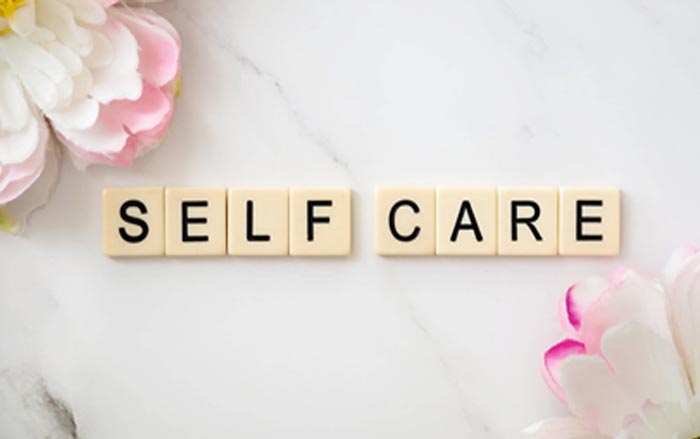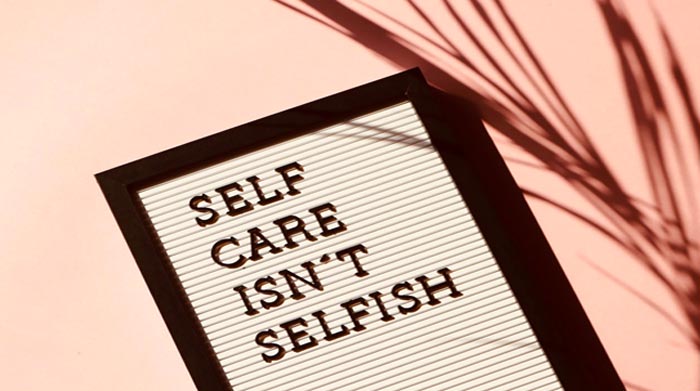How Can You Take Care of Yourself During the COVID-19 Pandemic?
Katharine Nelson, Student Curator
Why self-care?
Even during the best of times, self-care can often be a struggle. There’s always some reason to not take a moment for ourselves. Now, with the COVID-19 pandemic throwing the world and our lives into disarray, it’s especially difficult to focus on ourselves. Trying to balance everything can feel overwhelming. But this is exactly when we need to make some time for self-care. It’s recommended by doctors and therapists alike as a way to improve our mood and reduce anxiety and stress.
What exactly is self-care?
It’s taking some time out of our busy schedules to prioritize ourselves and our wellbeing.
It’s engaging in an activity deliberately for the purpose of nurturing our mental, emotional, and physical health. Think of it as refueling or recharging ourselves.
It’s unique to each person! What may be relaxing for one person, may not be for another. Find what works for you.
It’s not selfish. Everyone needs some time to recharge their internal batteries. After all, if we don’t take care of ourselves, how can we take care of others?
It doesn’t replace your doctor or therapist. If you are struggling, make sure you reach out to a professional. Self-care is in addition to following the advice of a doctor and/or therapist.
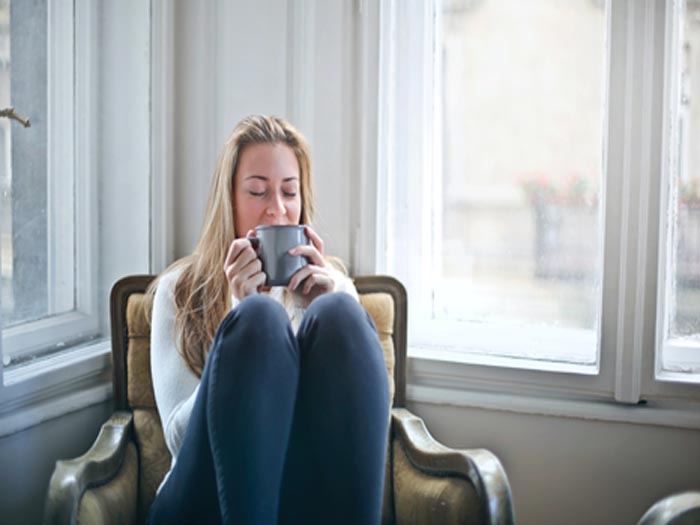
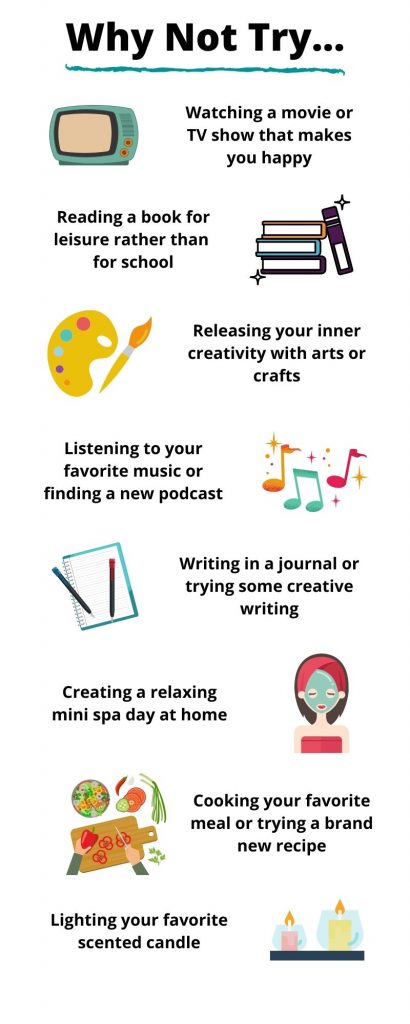
How can I take care of myself?
- Get enough sleep. It’s recommended that adults sleep at least 7-8 hours a night. It’s time for your mind and body to refresh themselves. If you’re having trouble sleeping, try establishing a nighttime sleep routine. A specific routine will tell your mind and body that it’s time to prepare for bed.
- Eat healthy. Having a nutritious diet is essential to our health and wellbeing. Avoid drugs and alcohol.
- Exercise. It’s good for mental health as well as physical health! Exercise increases serotonin levels in the brain, which can lead to improved mood and increased energy. Try to find an exercise you enjoy, even if it’s simply walking for 30 minutes a day, so that you stick with it. Create a routine that works for you!
- Try to get outside if you can. Nature can help reduce stress and re-energize us. Take a walk around your neighborhood. Open your windows and let in some fresh air.
- Learn to say “no”. Many of us commit ourselves to too many things and are stretched too thin. Learn to establish boundaries with ourselves and other people so as to avoid extra stress and burnout.
- Spend time with people we love. Even though many of us can’t see our friends and family members, be sure to reach out to them virtually.
- Consider making a gratitude list.
- Consider relaxation exercises or meditation. Even a few minutes a day can make a difference!
- Try to do something pleasurable every day. Some examples are on the left.
Meditation
Meditation is an ancient practice that’s moved into them mainstream over the past number of years. Though it is rooted in many of the world’s religions, it does not have to be religious in nature. Meditation can leave you with a sense of calm and clarity, which is something we could all use at this moment. It’s simple, inexpensive, and can take as little as a few minutes. There are many kinds of meditation. Finding the right one is very much about finding what fits best for you. Among the most popular in the West right now is mindfulness meditation.

Some fast facts about meditation:
-
- 30% of Americans overall have mediated in the last week to cope with stress, according to a new article about self-care during the pandemic from The New York Times (https://www.nytimes.com/2020/04/08/parenting/coronavirus-self-care.html)
- A study by Johns Hopkins University found that mindfulness meditation can help ease anxiety, depression and even pain. (https://www.health.harvard.edu/blog/mindfulness-meditation-may-ease-anxiety-mental-stress-201401086967)
- The Mayo Clinic also recommends meditation as a useful tool for dealing with stress. (https://www.mayoclinic.org/tests-procedures/meditation/in-depth/meditation/art-20045858)

Mindfulness
Mindfulness itself is about having an awareness of your thoughts, feelings and physical sensations in the present moment.
It’s also about accepting those thoughts and feelings without judgement or criticism of them or yourself.
It’s about distancing yourself from overwhelming thoughts, not necessarily completely emptying the mind.
It can take place in a meditation session or a moment in everyday life, such as brushing your teeth. You simply stay focused on the action you’re doing and the present moment and sensations.
How do you meditate?
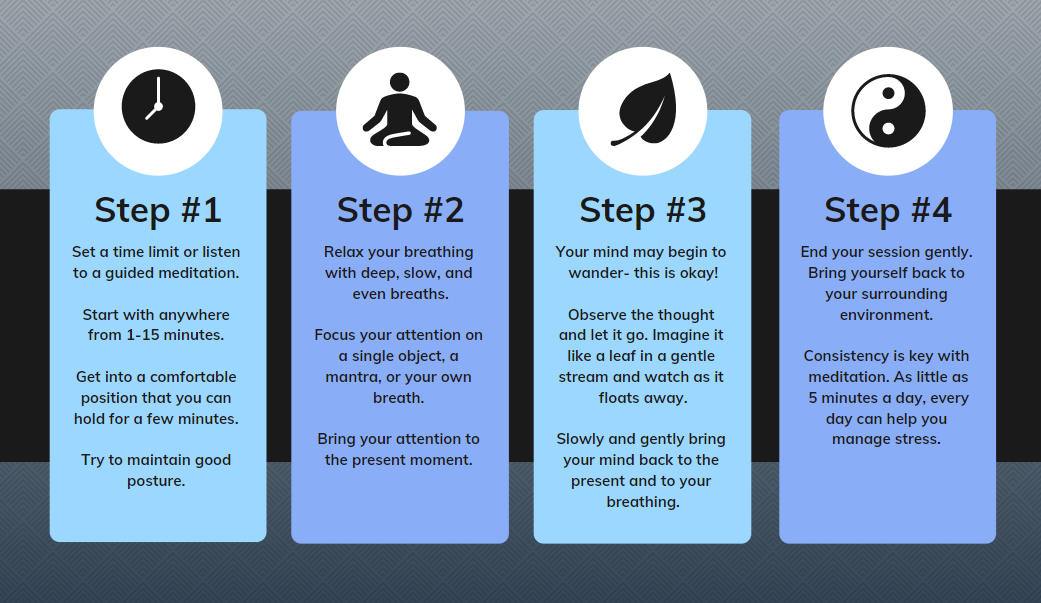
Resources
The New York Times’ Guide to Meditation: https://www.nytimes.com/guides/well/how-to-meditate
The Rubin Museum of Art’s Guided Mindfulness Meditation Podcast: https://rubinmuseum.org/mediacenter/category/mindfulness-meditation-podcast
Mindful: https://www.mindful.org
Various meditation apps are available for download, as well as meditations available to be streamed on YouTube
